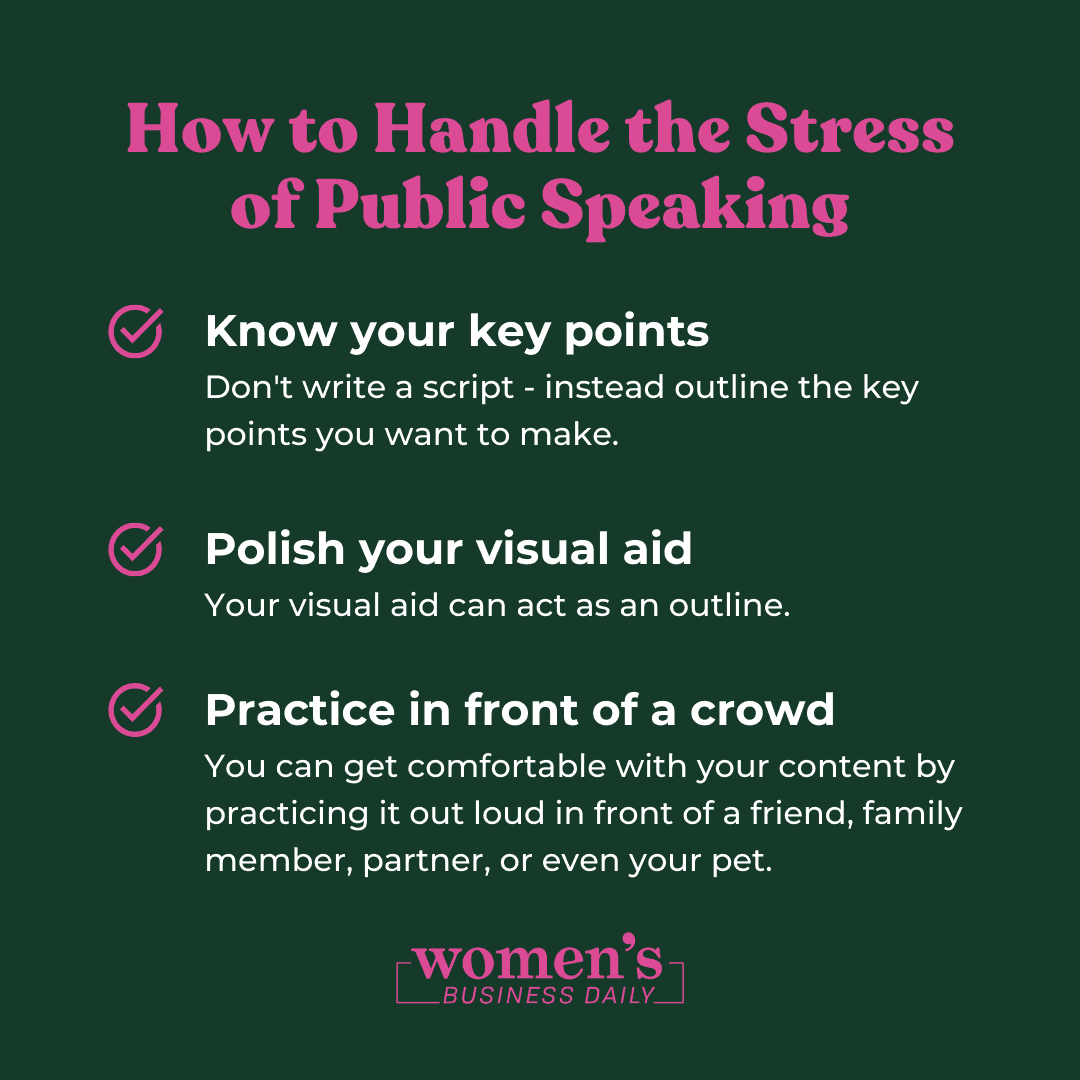Public Speaking: How to Feel Confident In Front of Your Peers

You’re dizzy, shaking, nervous, and your stomach is doing somersaults; your boss just asked you to give a presentation and the stage fright you’ve had since a kid is back with full force. Some people just cannot stand the thought of public speaking and will do anything and everything to escape it. Unfortunately, it’s a skill you need in almost every career.
If you experience anxiety when thinking about speaking in public, you certainly aren’t alone; a whopping 77% of people in the United States have some level of anxiety when it comes to public speaking.
Since public speaking is a professional necessary evil, let’s walk through some ways you can train your body to stay calm while speaking publicly.
The Biological Fear of Public Speaking
The fear of public speaking is more primal and biological than you might think. Evolutionarily, our bodies are programmed to avert direct gaze from others, specifically predators. While this sweating, increased heart rate, shaking, and nauseousness seem a wild inconvenience when you’re just trying to give a presentation, it’s actually your body trying to save your life.
Think about it from your body’s perspective. If you’re out hunting and feel that you’re being watched, there could be predators nearby. Your body heightens your awareness so you can more clearly perceive your surroundings and accelerates the heart rate so you can run faster when you discover you’re being watched by a lion.
So when you think about walking into a room of predators whose only job is to make eye contact with you while you talk, you can start to understand where this fight or flight response comes from.
Unfortunately, our bodies have not quite figured out that the dangers we experience now need significantly different biological responses than they did in the Stone Age. Our body is equipped to handle immediate fears, but not necessarily long-term ones.
Your body tries to handle the problem of talking in front of a crowd the same way it does you being stalked by a lion. Unfortunately, running away from your office or fighting Dave from accounting aren’t exactly viable options to deal with this stress.
Ways to Handle the Stress of Public Speaking
Once you understand where the biological fear of public speaking comes from, you can start to combat the instinctual responses your body has to stand and speaking in front of an audience.
If you feel your breath starting to catch in your chest and you begin to hyperventilate, you can take control of your breathing to stop your panic response. Your breathing informs your body how it should feel, so the longer you let your body breathe quickly and irregularly, the more panicked your body will become.
Focus on a still object in front of you or close your eyes. Breathe in for a count of four, hold for a count of two, and exhale for a count of six. If you can’t breathe out for that long, breathing in and out four counts will still help you slow down.
Another way to combat biological panic is by clenching your muscles for a few seconds and then relaxing. When you do this, you’re informing your body that you are responding to its warnings. If your body wants you to run from the perceived threat, it won’t know what to do with the excess energy when you don’t run away. Stretching and clenching your muscles convinces your muscles that you have handled the threat.
If you have the opportunity, practicing meditation can help your breath slow down and your body relax. There are a bunch of meditations you can do while sitting at your desk. Not all of them require you to lay down. If you download Insight Timer and use your headphones, you can meditate right before your presentation in the office.
Beyond the biological approach, you can help assuage your nerves through preparation. The more you practice, the more you become comfortable with the material, the more relaxed you’ll feel about speaking in front of the crowd.
Here are some steps to help you get ready:
- Know your key points. If you write out every word you’re going to say, your performance will come off as scripted and stagnant. Instead of writing a script, outline the key points you want to hit. This will help keep you on track without making your public speech seem boring.
- Polish your visual aid. If done correctly, your visual aid can act as an outline. Not in the sense that it will have every single one of your points on there, but you can make the slides correspond to your key points, so if you get lost, you can reorient yourself when you move to the next slide.
- Practice in front of a crowd. Whether that crowd is a group of friends, a partner, your mom, your dog, or a stuffed animal, you can practice your delivery, eye contact, and tone. No matter how many times you’ve read the content, you won’t get a genuine feel for how it will be delivered unless you actually practice saying it out loud.

The best way to really see how effectively your message is getting across is to record yourself and watch your own performance.
I know. That sounds terrifying.
For better or worse, this is the single best way to pick up on any bad habits or ticks you have as a speaker. You may not realize how many times you say “um,” but the camera will. You can see if you’re swaying, repeating yourself, not making eye contact, fidgeting, exhibiting closed-off body language, or any other habit you want to eliminate from your speech. While it’s extremely uncomfortable for most people to watch or hear themselves speak, being able to take notes on how you can improve will astronomically alter the quality of your public speaking skills.
Once you no longer want to watch yourself, it’s a good idea to watch other successful public speakers. You can watch Ted Talks on virtually any topic; even on public speaking itself. Analyzing what you like or don’t like about their speech will help you incorporate or avoid those techniques in your own speaking.
Becoming a Great Public Speaker
The fear of public speaking is not something you can overcome overnight. Some people will always feel a little uncomfortable speaking in public, no matter how much they practice. However, the more you practice, the more you prepare, and the more you learn about ways to counteract biological responses, the closer you get to being a confident, articulate, and engaging public speaker.
If you’d like to learn from other women who have conquered their fear of public speaking, join WBD! We have the resources and the community to help you achieve your professional goals and take control of your own career.
Author, Artist, Photographer.
Sarah Margaret is an artist who expresses her love for feminism, equality, and justice through a variety of mediums: photography, filmmaking, poetry, illustration, song, acting, and of course, writing.
She owns Still Poetry Photography, a company that showcases her passion for capturing poetic moments in time. Instead of poetry in motion, she captures visual poetry in fractions of a second, making cherished keepsakes of unforgettable moments.
She is the artist behind the Still Poetry Etsy shop, which houses her illustrations and bespoke, handmade items. She is the author of intricacies are just cracks in the wall, a narrative poetry anthology that follows a young woman discovering herself as she emerges from an abusive relationship.






Responses